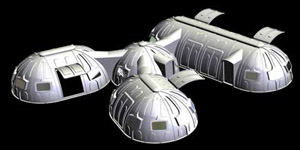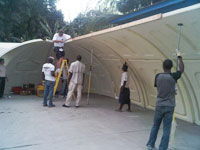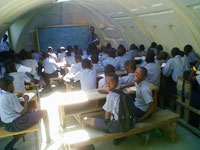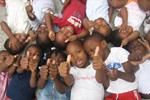Current Projects: April 2011
April mission: Provide 3 medical clinics to 3 NGO's.
CRC (Community Revitalization Centers) Program Overview:
In September 2010, CAN-DO entered into a strategic partnership with Composites Karayib (a new Haitian fiberglass company) and the National Leadership Conference of Haitian Mayors (NLCHM) to expand the CAN-DO Community Revitalization Center (CRC) Program.
Because of CAN-DO's track record in Haiti and our "get it done" attitude, the CRC program has quickly gained support from Haitian Mayors![]() who are understandably fed up with the visible lack of progress, despite the billions of dollars that have been either pledged or collected by NGO's working in Haiti.
who are understandably fed up with the visible lack of progress, despite the billions of dollars that have been either pledged or collected by NGO's working in Haiti.
 Sharing in that frustration, CAN-DO has devised a very simple, open and collaborative program – designed to deliver high impact results. In September of 2010, just months after the devastating earthquake in Haiti, CAN-DO began to refocus our efforts from short term to long term recovery – and we sought a solution that was both effective and sustainable. Thanks to a grant provided by Ron and Marlys of the Boehm Gladen Foundation, CAN-DO was able to begin sourcing dome structures from Composites Karayib to serve as strong and safe shelters such as medical clinics, birthing rooms, schools, offices and more.
Sharing in that frustration, CAN-DO has devised a very simple, open and collaborative program – designed to deliver high impact results. In September of 2010, just months after the devastating earthquake in Haiti, CAN-DO began to refocus our efforts from short term to long term recovery – and we sought a solution that was both effective and sustainable. Thanks to a grant provided by Ron and Marlys of the Boehm Gladen Foundation, CAN-DO was able to begin sourcing dome structures from Composites Karayib to serve as strong and safe shelters such as medical clinics, birthing rooms, schools, offices and more.
The mission of the Community Revitalization Centers is to implement long-term, sustainable solutions that will strengthen and reaffirm the devastated communities of Haiti, while maintaining a results-driven and transparent infrastructure. The key component in "CRC" is invoking community involvement. Focus is centered on creating a centralized hub where the community can come together and work to rebuild an infrastructure that is tailored to their individual needs and developmental goals – thereby encouraging great pride and self-respect. These needs can be expanded upon over time.
 The premise is simple: Dome structures serve as the foundation for customized community centers devoted to specific needs. Manufactured in Haiti by a workforce of Haitian employees, the fiberglass domes have a 35 year life span, and are resistant to rot and winds up to 135 miles per hour. These cost effective, efficient structures can be quickly set up, broken down, transported and repurposed - allowing them to serve as a long or short term solution with ease.
The premise is simple: Dome structures serve as the foundation for customized community centers devoted to specific needs. Manufactured in Haiti by a workforce of Haitian employees, the fiberglass domes have a 35 year life span, and are resistant to rot and winds up to 135 miles per hour. These cost effective, efficient structures can be quickly set up, broken down, transported and repurposed - allowing them to serve as a long or short term solution with ease.
CAN-DO, along with the NLCHM will assess the communities, determine the highest priorities and fulfill the most pressing needs first. An entire cluster, or hub of structures can easily be constructed in one day. Options include:
- School
- Medical clinic
- Hospital
- Day care
- Womens center
- Health Specialties (eye, prosthetics, dental)
- Job development efforts
- Multipurpose structure
 With the help of the Clinton Foundation, CAN-DO's CRC program plans to expand further into Haiti by installing additional domes, along with supporting infrastructure and services, in dozens of cities over the coming year. With this increase in demand, Composite Karayib hopes to ramp up to 100+ employees in the upcoming months, depending how quickly funds can be made available. Operating out of a factory in Port-Au_Prince, Composites Karayib has been helping to create jobs and stimulate economic development since September 2010.
With the help of the Clinton Foundation, CAN-DO's CRC program plans to expand further into Haiti by installing additional domes, along with supporting infrastructure and services, in dozens of cities over the coming year. With this increase in demand, Composite Karayib hopes to ramp up to 100+ employees in the upcoming months, depending how quickly funds can be made available. Operating out of a factory in Port-Au_Prince, Composites Karayib has been helping to create jobs and stimulate economic development since September 2010.
We invite participation by any organization, school, investor, foundation, or individual who agrees with our core principles. It will be essential to work within a college based collaboration, where schools can get involved in adopting a community at many different levels. As the CRC program continues to grow, the hope is to invite other grassroots orgs/NGOs working in Haiti as well as to tap the volunteer force for help with overseeing long term growth and sustainability. CAN-DO recognizes the value of expertise that other organizations can bring to the program – to help fill the gaps in specialty areas such as agriculture, medicine and education. CRC's can also be set up in areas where NGO's are already present, supporting and enhancing that particular organization's overall mission by providing safe, secure structures to carry out the goals at hand.
The CRC concept has been implemented by CAN-DO and proven successful in many field situations after disasters including: Sri Lanka and the Gulf Coast. After hurricane Katrina, CAN-DO set up over 20 "CRC"/PODS throughout the Gulf Coast, many of which are still in operation today.
In order to ensure the transition of the Haiti CRC program from "concept" to completion" we need help and financial support. CAN-DO will provide detailed documentation as each phase is accomplished and every CRC goal is reached – to convey the impact of your contribution at work.
Current CAN-DO Installations:- "JPHRO" (Petionville) - Women's Center & Birthing Clinic
- "Croix-des-Bouquets School" which now facilitates 1,200 students
- "We Advance" (Cite Soleil) Medical/Women Clinic in Wharf Jeremy, which now services an area of Cite Soleil where most mothers had never previously delivered in a hospital nor had any type of prenatal care. Now they do.
- "Haiti Clinic" Location: Cite Soleil **Medical Clinic
- "VMRT" (Vermont Medical Response Team) Locatoin: Delmas 33 **Medical Clinic
- Not yet determined

 "The Community Revitalization Centers create a win-win situation for all parties concerned. Finally, local governments, the private sector, NGOs, and donors are coming together with a viable, scalable project. We locals will determine the highest priorities. The beauty of this true collaboration is that no one NGO dictates the approach or outcome, but many participate in creating a better, more effective, and sustainable solution."
"The Community Revitalization Centers create a win-win situation for all parties concerned. Finally, local governments, the private sector, NGOs, and donors are coming together with a viable, scalable project. We locals will determine the highest priorities. The beauty of this true collaboration is that no one NGO dictates the approach or outcome, but many participate in creating a better, more effective, and sustainable solution."
Joseph G. "Billy" Louis
Executive Director, GALATA
 After CAN-DO arrived on the ground in Haiti only days after the quake, we immediately began setting up and distributing emergency supplies. Within the first six months CAN-DO was responsible for distributing over 250,000 gallons of water, 8,000 lbs of medical supplies to local hospitals, over 11 tons of food and 2 tons of bottled water. Today, we continue to make supply drops at multiple orphanages, camps and hospitals in Port Au Prince and the outlying areas of Haiti.
After CAN-DO arrived on the ground in Haiti only days after the quake, we immediately began setting up and distributing emergency supplies. Within the first six months CAN-DO was responsible for distributing over 250,000 gallons of water, 8,000 lbs of medical supplies to local hospitals, over 11 tons of food and 2 tons of bottled water. Today, we continue to make supply drops at multiple orphanages, camps and hospitals in Port Au Prince and the outlying areas of Haiti.
As time passed since the earthquake, most disaster relief organizations and NGO's have pulled out of Haiti. As supplies became scarce and funding started to dwindle, most all of the distribution efforts began to taper-off; CAN-DO has renewed its commitment to continue to distribute supplies to the orphanages.
The fact is that over 40% of Haiti's population is under the age of 15. Prior to the January 12th earthquake, Haiti was home to approximately 380,000 orphans and abandoned children. Today, that number is believed to be twice that or higher due to the quake. Haiti's orphanages are over-crowded, under-staffed and lacking in basic services. Many of the facilities are barely habitable and are in desperate need of repairs since the quake.
"I understand the "bandaid" analogy but under the circumstances we have no choice. Every orphanage we have delivered to was worse than the next. Never mind electricity and running water, they had nothing in the way of any type of stimulus. In many cases just four cement walls and a floor... like prison." (Eric Klein, founder)
Thankfully, some grassroots organizations, faith-based groups and individuals have stepped up and are doing what they can with the little they have. But when you look at the amount of money that has come to this country in the way of aid, the results are just not there and there is NO excuse for that - bottom line.
CAN-DO received an overwhelming response from our donors as well as the general public from a story CCN's, Sanjay Gutpta's did, where he went out with CAN-DO and exposed not only the living conditions of these an Orphanages, but shed a strong light on the lack of accountability by the larger NGO's.
Due to the influx of calls and emails and because we had preformed several assessments and the more involved we got personally, we thought, why not have our donors or anyone that wanted to volunteer or adopt an orphanage? When we started
doing this, we were able to, not only clean it and repair the orphanages up but bring the standard of living up significantly.
On July 13th, 2010 we sent out our first assessment video, which documented the project so the donors can see exactly where their money was going. Once again, the response was overwhelming. Within the first week raised enough money to cover our
budget and go back to Haiti.
1st phase – The Overhaul – This is where we clean, prep and repair holes, leaks etc and paint both the interior and exterior of the facility. A team of volunteers, along with local labor, renovate the physical space of each orphanage.
2nd Phase - Health Check – Where local doctors and clinics, check the kids for worms, scabies and other diseases and make them healthy.
3rd Phase - Sustainability - CAN-DO's hope is that once the space is renovated that though our contacts and word of mouth, expert volunteers in the areas of child welfare, fundraising, conflict resolution and education will provide training and support.
 Whenever entering into a project CAN-DO's goal is to employee local residence. During the Patience Orphanage Project CAN-DO employed over 20 local Electricians, masons, plumbers and painters.
Whenever entering into a project CAN-DO's goal is to employee local residence. During the Patience Orphanage Project CAN-DO employed over 20 local Electricians, masons, plumbers and painters.Haitians need aid NOW and CAN-DO is getting it to them. As Eric Klein, Founder of CAN-DO says, "The biggest problem you have in these disasters is there's a lack of communication between the people on the ground, the people that need the help and the people holding the check books...total disconnect."
Thanks to your financial contributions the last 6 months have been incredibly productive months for CAN-DO, its partner organizations and ultimately for the people of Haiti.
During previous trips to Haiti, the CAN-DO team worked closely with the local people to come up with a productive and efficient method to ensure food and water reached people living in some of the most desolate areas of Haiti. It was decided it could be done simply by identifying affiliated partners looking for help with aid distribution, renting large trucks for transporting aid and hiring local Haitians to organize and distribute the aid to their local people. This method proved successful in the smaller camps. We are now moving forward implement this in larger camps, hospitals and orphanages. Klein says "At the end of the day, people just want to see results. It's not about finger pointing, it's about accountability and common sense."
CAN-DO established a new partnership with Food for the Poor, an international development and relief charity that offers relief assistance to the poor in Latin American and the Caribbean. Food for the Poor passed 9 of their 40ft shipping containers full of food, water and medical over to CAN-DO to distribute. The CAN-DO team was thrilled and eager to take the project on.
To make it happen, CAN-DO and local Haitians assembled Camp Committees to help unload delivered aid, take inventory, assemble food packs, load them onto trucks, drive them to camp, and begin distribution to the families through a food card system. There is no reason aid should be left sitting in warehouses.
A huge thanks to Kareen Dolc'e, Director of Food for the Poor, and her team - Javier Rameriez, Junior Medard - for partnering with us to ensure food and aid get to those who need it most, as quickly as possible.
 (Click here for a video that explains the partnership)
(Click here for a video that explains the partnership)![]()
CAN-DO.ORG 6TH MONTH PROGRESS REPORT:
JAN/FEB 2010:
$28K - 33 Days, CAN-DO Achieved
- 24 Assessments
- 17 Supply Drops
- Family Placement
- Rescue and Recovery
CAN-DO Distributed:
- 150,000 gallons of purified water
- 14,0000lbs of Medical
- 8,000lbs of Food
to 6 Orphanages, 4 Hospitals, 11 Camps
APRIL/MAY 2010: (Click here for vieo)
(Click here for vieo)![]()
$20k - 15 days, CAN-DO delivered:
- 7 Tons of bottled water
- 27,000 gallons of water to 10 locations via water trucks
- 8+ Tons of food & medical supplies
- 247 peace packs (courtesy of Kids For Peace) to orphanages
To, 4,000+ families, 7 camps, 5 orphanages, 3 hospitals
JUNE 2010:
CAN-DO and it's partner CCS, completed construction of the first hurricane/earthquake and water resistant structure of it's kind built in Haiti since the earthquake. This structure is now the J/P HRO Medical Clinic and it is already seeing patients,
 (Click here for video)
(Click here for video)![]()
JULY 2010:
JULY SUPPLY DROPS:
- Patients Orphanage
- Zion Orphanage
- OREA Orphanage
- Blessed Child Orphanage
- Hospital Adventiste d'Haiti
- General Hospital
- Camp - Diquini 63, Carrefour
CAN-DO is currently on the ground in Haiti- FOUNDER, ERIC KLEIN- ON CNN - ANDERSON COOPER 360, 7PM PST/10PM EST.
CNN's Tony Harris talks to CAN-DO.org founder Eric Klein LIVE about problems with food distribution and accountability in Haiti.
 "Full warehouses, hungry kids" - July 2010
"Full warehouses, hungry kids" - July 2010![]()
AUGUST 2010 - UPCOMING PROJECT - HOAP (Haiti Orphanage Adoption Program)
Previous Update:
July 12, 2010 - Haiti Newsletter
Dear Supporters,
It's difficult to believe that 5 months after the earthquake on January 12th there are still people in Haiti who have yet to receive aid. Without a moment to waste, your donations have made it possible for CAN-DO to dive in to make an immediate and tangible impact on protecting and saving the lives of thousands of Haitian people.
We'd like to share and celebrate all we've been able to accomplish, thanks to your support.
The mission of April's trip was to reconnect and work with local Haitians and our affiliated partners to finalize the infrastructure necessary to offer immediate and organized distribution of aid within camp(s).
The Breakdown (videos included!)....
April 18th: Began water drops to Carrfour Feuille. Water has never been delivered to this isolated area until today.
April 19th: Secured a warehouse in Port au Prince where we received our first 4 shipping containers of food and water from Food for the Poor![]() . (Click here for a video that explains the partnership
. (Click here for a video that explains the partnership![]() ) Thank you Kareen Dolc'e, Director of Food for the Poor, for partnering with us to ensure food and aid get to those who need it most, as quickly as possible. Thanks also to Javier Rameriez, Junior Medard for your help.
) Thank you Kareen Dolc'e, Director of Food for the Poor, for partnering with us to ensure food and aid get to those who need it most, as quickly as possible. Thanks also to Javier Rameriez, Junior Medard for your help.
April 20-21st: Developed an aid distribution plan for Camp's Heritage and Eugene. CAN-DO worked with locals to assemble Camp Committees to help unload delivered aid, take inventory, assemble food packs, load them onto trucks, drive them to camp, and begin distribution to the families through a food card system. There is no reason aid should be left sitting in warehouses.
April 22nd: Delivered food, water & basic supplies to General Hospital, Foyer De La Patience Orphanage, Fontamara Orphanage & House of Zion Orphanage. Deliveries were put on hold to facilitate the transportation of two orphan babies in need of medical attention, to General Hospital for treatment. (CAN-DO and the Blu Moon Foundation![]() will now work with the "Haiti Orphanage Adoption Program" (HOAP) to assist any orphans in need of medical attention.)
will now work with the "Haiti Orphanage Adoption Program" (HOAP) to assist any orphans in need of medical attention.)
April 23rd: Continued drops of food, water and supplies to General Hospital, Sanatorium (TB Hospital), and Carrfour Feuille.
April 25th: Thanks to donations from BluMoon, Kathyrn Hamm & Veronica Sorrette, CAN-DO delivered 3,000 gallons of water in Carrefour Feuille to 1000+ families and 3,000 gallons of water to 350+ familes in Belgium Consulate.
April 27th: With Kids For Peace![]() delivered, "Peace Packs" that contained art and school supplies, toiletries and a personal note from an American child, to 4 Orphanages: Doors of Patience, House of Zion, Victory of Norter Dame and the Peace Hospital. Thanks Ruthie Kaminskas, the Kids for Peace representative, for joining us!
delivered, "Peace Packs" that contained art and school supplies, toiletries and a personal note from an American child, to 4 Orphanages: Doors of Patience, House of Zion, Victory of Norter Dame and the Peace Hospital. Thanks Ruthie Kaminskas, the Kids for Peace representative, for joining us!
April 28th: Delivered 7 tons of water to La Pa Ix Hospital and 2 new orphanages.
April's Summary
 (Click here to watch a video of CAN-DO's work with Kids for Peace & the distribution of aid below)
(Click here to watch a video of CAN-DO's work with Kids for Peace & the distribution of aid below)![]()
For under 20k, in less than 15 days, CAN-DO delivered:
- 7 Tons of bottled water
- 27,000 gallons of water to 10 locations via water trucks
- 8+ Tons of food & medical supplies
- 247 peace packs (courtesy of Kids For Peace) to orphanages
Haitians need aid Now and CAN-DO is getting it to them. As Eric Klein, Founder of CAN-DO says, "The biggest problem you have in these disasters is there's a lack of communication between the people that are out there to help, and the people that need help. At the end of the day it just comes down to common sense."
Thanks to your financial contributions the last 5 months have been incredibly productive months for CAN-DO, its partner organizations and ultimately for the people of Haiti.
During previous trips to Haiti, the CAN-DO team worked closely with the local people to come up with a productive and efficient method to ensure food and water reached people living in some of the most desolate areas of Haiti. It was decided it could be done simply by identifying affiliated partners looking for help with aid distribution, renting large trucks for transporting aid and hiring local Haitians to organize and distribute the aid to their local people. This method proved successful in the smaller camps. We are now moving forward implement this in larger camps, hospitals and orphanages. Klein says "At the end of the day, people just want to see results. It's not about finger pointing, it's about accountability."
CAN-DO established a new partnership with Food for the Poor![]() , an international development and relief charity that offers relief assistance to the poor in Latin American and the Caribbean. Food for the Poor passed 9 of their 40ft shipping containers full of food, water and medical over to CAN-DO to distribute. The CAN-DO team was thrilled and eager to take the project on.
, an international development and relief charity that offers relief assistance to the poor in Latin American and the Caribbean. Food for the Poor passed 9 of their 40ft shipping containers full of food, water and medical over to CAN-DO to distribute. The CAN-DO team was thrilled and eager to take the project on.
To make it happen, CAN-DO and local Haitians assembled Camp Committees to help unload delivered aid, take inventory, assemble food packs, load them onto trucks, drive them to camp, and begin distribution to the families through a food card system. There is no reason aid should be left sitting in warehouses.
A huge thanks to Kareen Dolc'e, Director of Food for the Poor, and her team - Javier Rameriez, Junior Medard - for partnering with us to ensure food and aid get to those who need it most, as quickly as possible.
 (Click here for a video that explains the partnership)
(Click here for a video that explains the partnership)![]()
CAN-DO has shown the critical role it plays in getting food, water and medical supplies into the hands of those who need it most.
Please make a Donation today![]() to help CAN-DO continue its critical work. Donations will help us rent trucks and hire locals to help distribute aid.
to help CAN-DO continue its critical work. Donations will help us rent trucks and hire locals to help distribute aid.
Thank you for your support. You are the real heroes of Haiti. We’re just here to help.
Best Regards,
CAN-DO Team
PS - Right now, the CAN-DO Team is building shelter for Haitians and their families in preparation for hurricane season! Follow us on our website, and on our Facebook, and Twitter pages.






